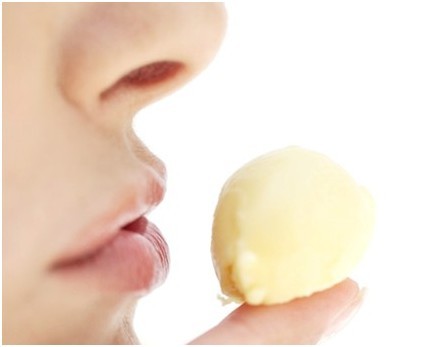
The case for pure fat
USINFO | 2013-11-08 14:26

Schmaltz isn't either, nor are nut oils, suet and other naturally tasty fats that have gotten a bad rap over the years. So how about a grand return now that trans fat may be getting the heave-ho from the American menu?
Trans fat can be found in processed foods including vegetable shortenings, some margarines, crackers, cookies, snack foods and other foods made with or fried in partially hydrogenated oils. Advocacy groups such as the Center for Science in the Public Interest have long been making the case for trimming it from the national diet, calling the partially hydrogenated oil that is the source of artificial trans fat "the most harmful fat of all."
In 2007, the New York City Board of health took decisive action to eliminate the use of partially hydrogenated vegetable oils and spreads in the city's restaurants – a move that was found to reduce the consumption sharply of these unhealthy fats among fast-food customers, according to a study by city health officials.
"The transition was seamless. Most New Yorkers didn't even notice," said Christine Curtis, a co-author of the study and director of the city's Nutrition Strategy Program.
The Food and Drug Administration has been paying close attention. The agency stepped into the fray Thursday and made the first move toward potentially eliminating most trans fat from the food supply. The FDA said it has made a preliminary determination that partially hydrogenated oils are no longer "generally recognized as safe" (often abbreviated as GRAS). If this decision is finalized, these additives couldn't be used in food without approval and effectively could not be sold.
So might butter, lard (the nonhydrogenated version) and the like make a grand and delicious return to the global diet?
Chefs such as Jennifer McLagan would surely applaud. In her James Beard Award-winning "Fat: An Appreciation of a Misunderstood Ingredient, with Recipes," McLagan wrote, "Pork fat is not only useful, but it is also good for us." She illustrated her point with a chart showing that 45% of pork fat is monounsaturated, which can help raise good cholesterol and lower bad cholesterol.
Chef Marco Canora of Hearth restaurant and Terroir wine bars said he's unnerved by the disconnect in messages that consumers have gotten over the years. He told CNN, "In the coffee station with our bookkeeper, she pours thin, white liquid disguised as milk into her coffee. She notices the clumps of cream in the glass of milk I'm pouring for myself and says. 'That's gross, those clumps freak me out so much, how can you drink that?' Really? How can I drink farm-fresh, cream-on-top milk from the Finger Lakes?"
"People don't know any better," Canora said. "We have done an awful job of educating people about what the good choices are. Big food has too much influence on our perceptions."
A 2009 study conducted by the American Journal of Clinical Nutrition served to bust the belief that saturated fats are detrimental to heart health, as had one been thought. The study concluded: "A meta-analysis of prospective epidemiologic studies showed that there is no significant evidence for concluding that dietary saturated fat is associated with an increased risk of CHD (coronary heart disease) or CVD (cardiovascular disease)." That means butter and animal fat aren't a guaranteed one-way ticket on the heart attack express as had been previously believed.
But before we all start smearing our faces in bacon grease and taking to the streets with butter batons in celebration, let's check in with a few nutritionists.
Nutritionist Karen Congro, director of the Wellness for Life program at the Brooklyn Hospital Center, weighed in, saying in an e-mail, "Butter, lard and olive oil all have saturated fats, but they are natural products. A small amount of saturated fat in the body is necessary to make hormones and absorb vitamins.I would never call butter or lard 'health foods,' but in very small amounts, they are not a problem. There are no safe levels of trans fats."
There is, however, an even better solution, Congro said. "Olive oil has the very beneficial monounsaturated fats, which are very good in helping lower cholesterol triglycerides and can help in weight loss. Olive oil, which is a big part of the Mediterranean diet, has proven to be even healthier than expected. Healthy eating does not mean eliminating fat from your diet, but rather eating healthy fats, such as olive oil, nuts, avocado, and eliminating the bad fats of which trans fats are the worst offender."
Rebecca Solomon, clinical nutrition coordinator at Mount Sinai Hospital, is also an olive oil advocate. “The poly and monounsaturated fats are the best (olive oil, canola oil). Saturated fats like lard or butter are significantly worse for you than the unsaturated fats but not as bad as trans fats."
"Not as bad" may not be quite the rallying cry that full-fat fans were hoping for, but we'll take encouragement where we can get it.
Solomon also cautioned against excess, even with the "healthier" fats, writing: "All fats, however, have the same number of calories per tablespoon, so keep in mind that a tablespoon of butter has 90 calories, as does a tablespoon of olive oil. Olive oil, however, has heart healthy benefits. Then again, you wouldn’t want to make a batch of chocolate chip cookies with olive oil."
But perhaps we just need to chew the fat on that last claim (along with a few delicious cookies), while we all figure out fat's future in our diets.
Share this page



















